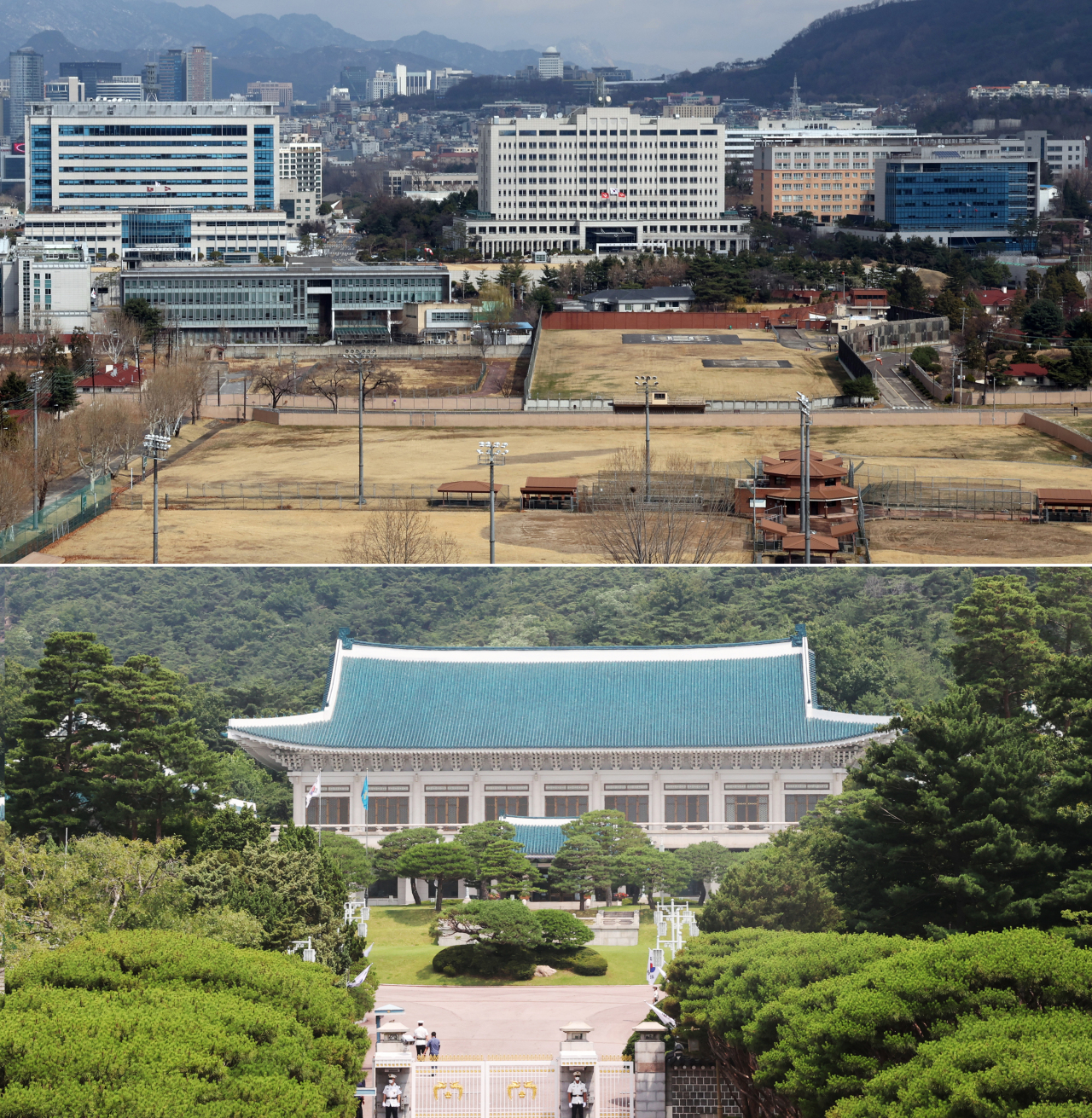 |
The Ministry of National Defense compound (top) in Yongsan, Seoul, and Cheong Wa Dae in Jongno, Seoul. (Yonhap) |
Incumbent President Moon Jae-in’s office on Monday raised concerns over the plans to relocate the presidential office, adding to the controversy surrounding the plans.
“President Moon Jae-in pledged to open the Gwanghwamun era in the past presidential election, and we do agree on the idea of returning Cheong Wa Dae to the public,” Park Soo-hyun, senior presidential secretary for public communication for Moon, said after the government’s National Security Council meeting on Monday.
“But it is impractical to relocate the Defense Ministry, the Joint Chiefs of Staff, the presidential office, the aide’s office in such a short period of time, especially now when security risks are heightened,” Park said, adding that it is only reasonable to proceed with such relocations when the respective facilities are ready.
President-elect Yoon Suk-yeol had announced that he will launch his presidential office at the Ministry of National Defense compound upon his inauguration on May 10, and have the Joint Chiefs of Staff headquarter and other military facilities in the compound to other government buildings.
Park noted that there have already been 10 missile launches by North Korea this year, and that April has usually been the most critical period for South Korea’s national security with North’s annual military parade and events.
“They should also review readjusting the air defense system that is currently set up around Cheong Wa Dae,” Park added.
Earlier in the day, Yoon’s spokesperson said the current presidential office Cheong Wa Dae will be turned into a “cultural and historical venue” for Koreans and returned to the public immediately in May.
“It is where South Korea’s modern history of glory and shame is engraved, and it will become a historical cultural space,” spokesperson Kim Eun-hye said during a press briefing.
Aware of criticisms from the opponents on the feasibility and the purpose of the relocation, Kim also reiterated the plan reflects Yoon’s determination “to move away from an imperial presidency, and not govern above other state officials.”
Listing the various possibilities for the Cheong Wa Dae compound, including turning it into a site for presidential archives, a museum or an exhibition, the spokesperson also said its value will be “beyond imagination,” when returned to the public.
“I once saw an air carrier compound being priced at some 400 to 500 billion won ($329 million to $411 million), but its size was only one-tenth of the Cheong Wa Dae compound,” Kim said.
“We ask for opinions on ways to change the Cheong Wa Dae building to provide a venue for authentic education for children, and as a space to inspire pride among Koreans.”
While the ruling Democratic Party of Korea has criticized the relocation as being overly expensive, costing some 1 trillion won for a complete relocation, Kim refuted the criticisms, questioning how that figure was calculated.
“We have already said it would cost about 4.9 billion won. If the Joint Chiefs of Staff building is moved and rebuilt in the area near Namtaeryeong Station (in southeastern Seoul), we have also explained it will cost about 120 billion won,” Kim said.
On cooperation with the incumbent government over the relocation, Kim said they reviewed the budget proposal using the state reserve fund with the finance and interior ministries, and that the proposal is likely to be tabled at the Cabinet meeting on Tuesday.
By Jo He-rim (
herim@heraldcorp.com)








